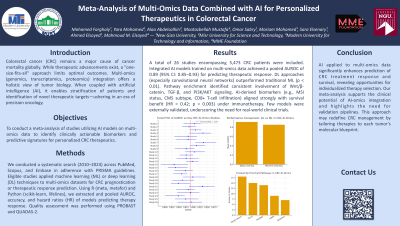Monday Poster Session
Category: Colon
P2409 - Meta-Analysis of Multi-Omics Data Combined With AI for Personalized Therapeutics in Colorectal Cancer


Mohamed Farghaly, MBBCh
New Giza University
6th of October, Al Jizah, Egypt
Presenting Author(s)
1New Giza University, 6th of October, Al Jizah, Egypt; 2New Giza University, Rehab City, Al Qahirah, Egypt; 3Misr University for Science and Technology, Rehab City, Al Qahirah, Egypt; 4Modern University for Technology & Information, Rehab City, Al Qahirah, Egypt; 5New Giza University, New Cairo, Al Qahirah, Egypt; 6MME Foundation, Monsoura, Ad Daqahliyah, Egypt
Introduction:
Colorectal cancer (CRC) remains a major cause of cancer mortality globally. While therapeutic advancements exist, a "one-size-fits-all" approach limits optimal outcomes. Multi-omics (genomics, transcriptomics, proteomics) integration offers a holistic view of tumor biology. When coupled with artificial intelligence (AI), it enables stratification of patients and identification of novel therapeutic targets—ushering in an era of precision oncology.
To conduct a meta-analysis of studies utilizing AI models on multi-omics data to identify clinically actionable biomarkers and predictive signatures for personalized CRC therapeutics.
Methods:
We conducted a systematic search (2010–2024) across PubMed, Scopus, and Embase in adherence with PRISMA guidelines. Eligible studies applied machine learning (ML) or deep learning (DL) techniques to multi-omics datasets for CRC prognostication or therapeutic response prediction. Using R (meta, metafor) and Python (scikit-learn, lifelines), we extracted and pooled AUROC, accuracy, and hazard ratios (HR) of models predicting therapy response. Quality assessment was performed using PROBAST and QUADAS-2.
Results:
A total of 26 studies encompassing 5,473 CRC patients were included. Integrated AI models trained on multi-omics data achieved a pooled AUROC of 0.89 (95% CI: 0.85–0.93) for predicting therapeutic response. DL approaches (especially convolutional neural networks) outperformed traditional ML (p < 0.01). Pathway enrichment identified consistent involvement of Wnt/β-catenin, TGF-β, and PI3K/AKT signaling. AI-derived biomarkers (e.g., MSI status, CMS subtype, CD8+ T-cell infiltration) aligned strongly with survival benefit (HR = 0.42; p = 0.003) under immunotherapy. Few models were externally validated, underscoring the need for real-world clinical trials.
Discussion:
AI applied to multi-omics data significantly enhances prediction of CRC treatment response and survival, revealing opportunities for individualized therapy selection. Our meta-analysis supports the clinical potential of AI-omics integration and highlights the need for validation pipelines. This approach may redefine CRC management by tailoring therapies to each tumor’s molecular blueprint.
Disclosures:
Mohamed Farghaly, MBBCh1, Yara Mohamed, MBBCh2, Alaa Abdelsalhin, MBBCh3, Moatazbellah Mustafa, MBBCh4, Omar Sabry, MBBCh5, Mariam Mohamed, MBBCh2, Sara Elsenary, MBBCh5, Ahmed Elsayed, MBBCh5, Mahmoud M. Elsayed, MD6. P2409 - Meta-Analysis of Multi-Omics Data Combined With AI for Personalized Therapeutics in Colorectal Cancer, ACG 2025 Annual Scientific Meeting Abstracts. Phoenix, AZ: American College of Gastroenterology.
